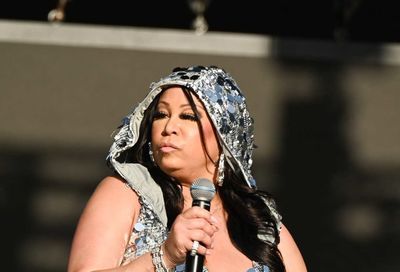Lesbian couple sues Trump administration and South Carolina over foster care discrimination
HHS-granted waiver allows agencies to turn away same-sex couples and others based on agencies' religious beliefs

A lesbian couple is suing the Trump administration and the state of South Carolina after the U.S. Department of Health and Human Services allowed foster care and child placement agencies to discriminate against prospective parents.
Lambda Legal, the American Civil Liberties Union, the ACLU of South Carolina, and the South Carolina Equality Coalition have filed a lawsuit on behalf of Eden Rogers and Brandy Welch, who claim they were discriminated against when their application to become foster parents was rejected by Miracle Hill Ministries of Greenville, S.C.
Miracle Hill has been in the news in recent months after the Trump administration granted a waiver to South Carolina allowing foster care agencies to cite their religious beliefs as justification for turning away potential foster or adoptive parents who are not evangelical Protestant Christian or same-sex couples of any faith.
In order to foster children, Miracle Hill requires prospective parents to sign a “doctrinal statement” stating that “God’s design for marriage is the legal joining of one man and one woman in a life-long covenant relationship.”
Welch, an accountant and cost engineer, and Rogers, an educator, are currently raising two daughters, ages 7 and 10, and want to open their home to foster children because of Rogers’ past family experiences.
“After family challenges, I helped raise my siblings. I know firsthand the fear and stress that children feel when they are forced to leave their homes,” Eden said in a statement. “As a mother and an educator, I want to make sure children in foster care have a safe, supportive, and loving home when they need one.”
The women, who are also members of the Unitarian Universalist Church, submitted an application indicating their desire to “provide and safe and loving environment” for children.
But Miracle Hill rejected the application, saying they felt “a religious obligation to partner with foster parents who share our beliefs and who are active in a Christian church” and that Miracle Hill would not be a good partner for in helping them find children to be placed in their home.
Welch and Rogers subsequently sued HHS and South Carolina, alleging discrimination. The lawsuit, filed in U.S. District Court for the District of South Carolina, claims that the waiver violates the Establishment, Equal Protection, and Due Process Clauses of the U.S. Constitution by authorizing Miracle Hill and other foster care agencies in the state to use religious criteria to screen out prospective parents because of their faith or sexual orientation.
“We work hard to raise our own two girls in a loving and stable home. Faith is a part of our family life, so it is hurtful and insulting to us that Miracle Hill’s religious view of what a family must look like deprives foster children of a nurturing, supportive home,” Welch said in a statement.
“Trump’s HHS and South Carolina should not be permitting foster care agencies that receive taxpayer money to care for wards of the State to disqualify potential foster parents because they don’t conform to a religious litmus test,” Currey Cook, counsel and director of Lambda Legal’s Youth in Out-of-Home Care Project, said in a statement. “Agencies have no right to exclude families because of their faith or sexual orientation…. By allowing Miracle Hill to discriminate against this couple, the government is not only favoring certain religious beliefs over others, but is also placing those beliefs above what is in the best interest of children in foster care.”

The ACLU of South Carolina reiterated its opposition to the waiver in a statement, objecting to the fact that Miracle Hill and agencies with similar beliefs are allowed to receive taxpayer money while discriminating against prospective parents.
“The state of South Carolina and the Trump Administration have turned their backs on the children of South Carolina who are in foster care,” said Susan Dunn, the legal director of the ACLU of South Carolina. “The 4,600 children in state care — many of whom live in group homes, are separated from siblings, or age out of foster care without ever becoming part of a family — need every qualified family that is willing to open their heart and home to a child. … Prospective foster and adoptive parents should be judged only on their capacity to provide love and support to a child.”
“There is simply no place for discrimination in our state’s foster care system,” Jeff Ayers, the executive director of South Carolina Equality, said in a statement. “South Carolina’s vulnerable children need loving families ready to give them loving homes. LGBTQ individuals and same-sex couples across South Carolina are those families, ready and able to provide those homes, and they should never be turned away just because they do not meet a foster care agency’s religious standards.”
Leslie Cooper, the deputy director of the ACLU’s LGBT & HIV Project, warned in a post on the ACLU’s website that the waiver allowing agencies to discriminate runs counter to the best interests of children in the foster care system.
“Giving states like South Carolina the green light to allow discrimination in the public child welfare system only adds to the shortage of families willing to foster or adopt a child in state custody,” Cooper wrote. “Families who are rejected by an agency because of their faith or sexual orientation may not have other options in their area. Even if they do, the sting and humiliation of discrimination may deter some from approaching other agencies to possibly face more discrimination.
“When families are deterred from fostering, this means that more children will be placed in group homes, separated from siblings, and age out of foster care without ever being adopted,” Cooper added. “Simply put, HHS and South Carolina have turned child welfare practice on its head by putting the interests of taxpayer-funded agencies above the interests of the children in their care.”
Support Metro Weekly’s Journalism
These are challenging times for news organizations. And yet it’s crucial we stay active and provide vital resources and information to both our local readers and the world. So won’t you please take a moment and consider supporting Metro Weekly with a membership? For as little as $5 a month, you can help ensure Metro Weekly magazine and MetroWeekly.com remain free, viable resources as we provide the best, most diverse, culturally-resonant LGBTQ coverage in both the D.C. region and around the world. Memberships come with exclusive perks and discounts, your own personal digital delivery of each week’s magazine (and an archive), access to our Member's Lounge when it launches this fall, and exclusive members-only items like Metro Weekly Membership Mugs and Tote Bags! Check out all our membership levels here and please join us today!




























You must be logged in to post a comment.